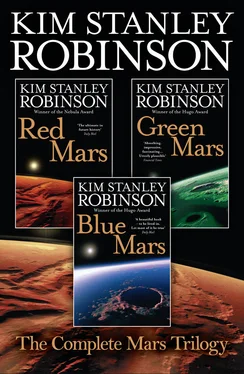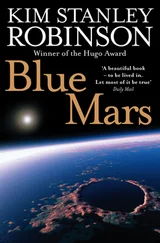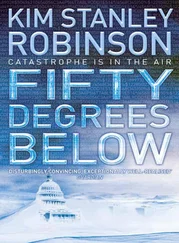After some thought Nadia said, “Add nylon.”
“What?”
“Go out and find the parachutes from the freight drops, and shred them real fine, and add them to the clay. That’ll help their tensile strength.”
“Very true,” Gene said, after a pause. “Good idea! Think we can find the parachutes?”
“They must be east of here somewhere.”
So they had finally found a job for the geologists that actually helped the construction effort. Ann and Simon and Phyllis and Sasha and Igor drove long-distance rovers over the horizon to east of the base, searching and surveying far past Chernobyl; and in the next week they found almost forty parachutes, each one representing a few hundred kilos of useful nylon.
One day they came back excited, having reached Ganges Catena, a series of sinkholes in the plain a hundred kilometers to the southeast. “It was strange,” Igor said, “because you can’t see them until the last minute, and then they’re like huge funnels, about ten kilometers across and a couple deep, eight or nine in a row, each smaller and shallower. Fantastic. They’re probably thermokarsts, but they’re so big it’s hard to believe it.”
Sasha said, “It’s nice to see such a distance, after all this near horizon stuff.”
“They’re thermokarsts,” Ann said. But they had drilled and found no water. This was getting to be a concern; they hadn’t found any water to speak of in the ground, no matter how far down they drilled: it forced them to rely on the supplies from the air miners.
Nadia shrugged. The air miners were pretty tough. She wanted to think about her vaults. The new improved bricks were appearing and she had started the robots building the walls and roofs. The brick factory filled little robot cars, which rolled like toy rovers across the plain to cranes at the site; the cranes pulled out bricks one by one, and placed them on cold mortar spread by another set of robots. The system worked so well that soon the bottleneck became brick production itself. Nadia would have been pleased, if she had had more faith in the robots: these seemed okay, but her experiences with robots in the years on Novy Mir had made her wary. They were great if everything went perfectly, but nothing ever went perfectly, and it was hard to program them with decision algorithms that didn’t either make them so cautious that they froze every minute, or so uncontrolled that they could commit unbelievable acts of stupidity, repeating an error a thousand times and magnifying a small glitch into a giant blunder, as in Maya’s emotional life. You got what you put into robots; but even the best were mindless idiots.
One evening Maya snagged her out in her tool room and asked her to switch to a private band. “Michel is useless,” she complained. “I’m really having a hard time, and he won’t even talk to me! You’re the only one I trust, Nadia. Yesterday I told Frank that I thought John was trying to undercut his authority in Houston, but that he shouldn’t tell anyone I thought so and the very next day John was asking me why I thought he was bothering Frank. There’s no one who will just listen and stay quiet!”
Nadia nodded, rolling her eyes. Finally she said, “Sorry, Maya, I have to go talk to Hiroko about a leak they can’t find.” She banged her faceplate lightly against Maya’s – symbol for a kiss on the cheek – switched to the common band and took off. Enough was enough. It was infinitely more interesting to talk to Hiroko: real conversations, about real problems in the real world. Hiroko was asking Nadia for help almost every day, and Nadia liked that, because Hiroko was brilliant, and since landfall had obviously raised her estimate of Nadia’s abilities. Mutual professional respect, a great maker of friendships. And so nice to talk nothing but business. Hermetic seals, lock mechanisms, thermal engineering, glass polarization, farm/human interfaces (Hiroko’s talk was always a few steps ahead of the game); these topics were a great relief after all the emotional whispered conferences with Maya, endless sessions about who liked Maya and who didn’t like Maya, about how Maya felt about this and that, and who had hurt her feelings that day … bah. Hiroko was never strange, except when she would say something Nadia didn’t know how to deal with, like, “Mars will tell us what it wants and then we’ll have to do it.” What could you say to something like that? But Hiroko would just smile her big smile, and laugh at Nadia’s shrug.
At night the talk still went everywhere, vehement, absorbed, unselfconscious. Dmitri and Samantha were sure that they could soon introduce genetically engineered micro-organisms into the regolith that would survive, but they would have to get permission first from the UN. Nadia herself found the idea alarming: it made the chemical engineering in the factories look relatively straightforward, more like brickmaking than the dangerous acts of creation Samantha was proposing … Although the alchemists were performing some pretty creative things themselves. Almost every day they came back to the trailer park with samples of new materials: sulphuric acid, sorel cements for the vault mortar, ammonium nitrate explosives, a calcium cyanamide rover fuel, polysulfide rubber, silicon-based hyperacids, emulsifying agents, a selection of test tubes holding trace elements extracted from the salts; and, most recently, clear glass. This last was a coup, as earlier attempts at glassmaking had produced only black glass. But stripping silicate feedstocks of their iron content had done the trick; and so one night they sat in the trailer passing around small wavy sheets of glass, the glass itself filled with bubbles and irregularities, like something out of the seventeenth century.
When they got the first chamber buried and pressurized, Nadia walked around inside it with her helmet off, sniffing the air. It was pressurized to 450 millibars, the same as the helmets and the trailer park, with an oxygen-nitrogen-argon mix, and warmed to about 15° Centigrade. It felt great.
The chamber had been divided into two stories by a floor of bamboo trunks, set in a slot in the brick wall two and a half meters overhead. The segmented cylinders made a sweet green ceiling, lit by neon tubes hung under them. Against one wall was a magnesium and bamboo staircase, leading through a hole to the upper story. She climbed up to have a look. Split bamboo over the trunks made a fairly flat green floor. The ceiling was brick, rounded and low. Up there they would locate the bedrooms and bathroom; the lower floor would be living room and kitchen. Maya and Simon had already put up wall hangings, made of nylon from the salvaged parachutes. There were no windows: lighting came only from the neon bulbs. Nadia disliked this fact, and in the larger habitat she was already planning, there would be windows in almost every room. But first things first. For the time being these windowless chambers were the best they could do. And a big improvement over the trailer park, after all.
As she went back down the stairs she ran her fingers over the bricks and mortar. They were rough, but warm to the touch, heated by elements placed behind them. There were heating elements under the floor as well. She took off her shoes and socks, luxuriating in the feel of the warm rough bricks underfoot. It was a wonderful room; and nice, too, to think that they had gone all the way to Mars, and there built homes out of brick and bamboo. She recalled vaulted ruins she had seen years ago on Crete, at a site called Aptera; underground Roman cisterns, barrel-vaulted and made of brick, buried in a hillside. They had been almost the same size as these chambers. Their exact purpose was unknown; storage for olive oil, some said, though it would have been an awful lot of oil. Those vaults were intact two thousand years after their construction, and in earthquake country. As Nadia put her boots back on she grinned to think of it. Two thousand years from now, their descendants might walk into this chamber, no doubt a museum by then, if it still existed – the first human dwelling built on Mars! And she had done it. Suddenly she felt the eyes of that future on her, and shivered. They were like Cro-Magnons in a cave, living a life that was certain to be pored over by the archeologists of subsequent generations; people like her who would wonder, and wonder, and never quite understand.
Читать дальше












